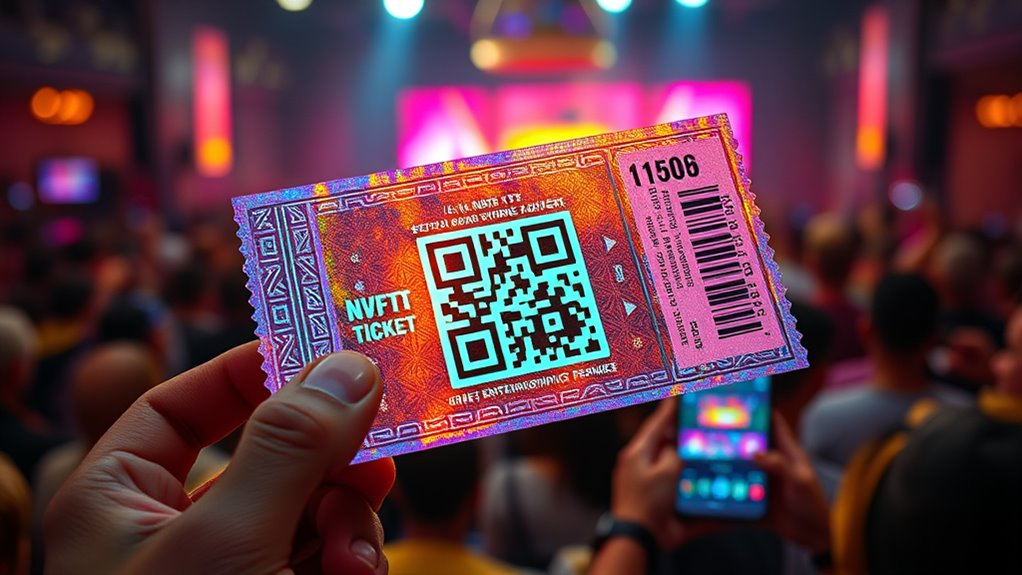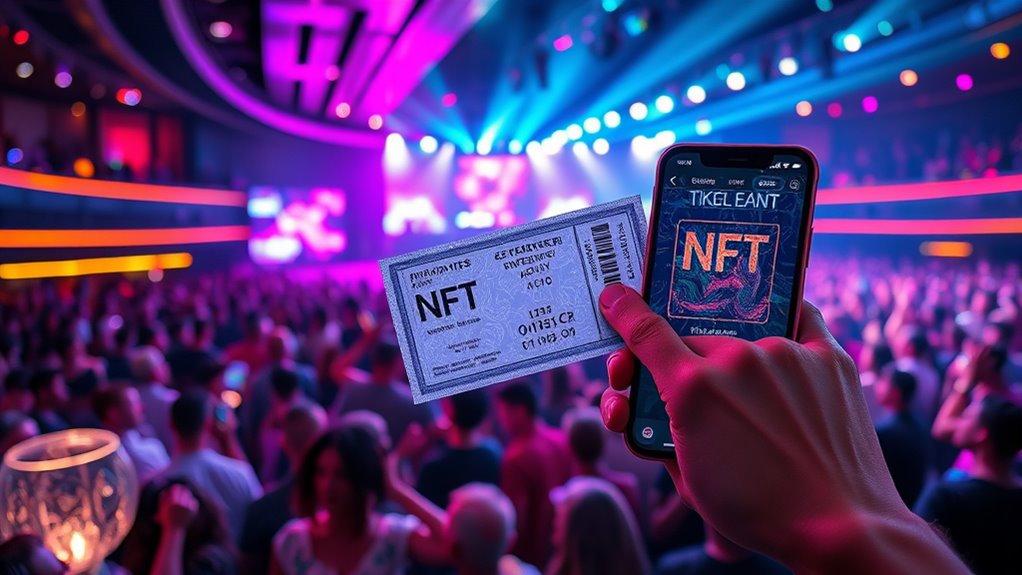NFT ticketing is more than just hype; it’s a long-term shift toward secure, tamper-proof event access. By using blockchain-backed digital collectibles, you get authentic tickets that are easy to verify and resell, reducing fraud. It also opens new ways for organizers to offer exclusive content and collectibles. While concerns remain about technology and market stability, the industry’s growing acceptance suggests this trend has staying power. Discover how this innovation could redefine your event experiences.
Key Takeaways
- Growing industry acceptance suggests NFT ticketing may become a standard, not just a hype.
- Blockchain’s security features ensure genuine tickets, supporting long-term trust in the system.
- Market volatility and technological complexity pose challenges to widespread, sustainable adoption.
- NFTs add value through resale, digital collectibles, and exclusive content, encouraging ongoing relevance.
- Environmental concerns and accessibility issues could hinder long-term growth, making it a mixed outlook.

Have you ever wondered how digital technology can transform the way we buy and sell event tickets? With the rise of NFT ticketing, the landscape is shifting from traditional paper or digital tickets to unique, blockchain-backed passes. These NFTs fundamentally act as digital collectibles, giving tickets a new level of ownership and value. Instead of simply scanning a barcode at the door, you’re holding a one-of-a-kind digital asset that proves your ticket’s authenticity. This shift aims to tackle common problems like ticket fraud and counterfeiting, which have plagued the industry for years. By leveraging blockchain technology, NFT tickets become tamper-proof, ensuring ticket authenticity. You can verify that your ticket is genuine easily and quickly, reducing the risk of scams and fake tickets flooding the market.
This new approach also adds a layer of exclusivity and potential for value appreciation. Since each NFT ticket is a digital collectible, it can be stored in your digital wallet, traded, or even resold on secondary markets. This creates a secondary market not just for tickets, but for collectible memorabilia tied to events. Imagine attending a concert and later reselling your NFT ticket to a collector who values its digital rarity. For organizers, this opens up new revenue streams and engagement opportunities, as they can include special perks or unique digital content as part of the ticket’s value proposition. For fans, it’s about more than just attending an event; it’s about owning a piece of that experience, which can increase in worth over time.
However, many skeptics question whether NFT ticketing is just hype or a sustainable long-term shift. Critics point out that the technology is still new and can be complex for the average user. Concerns around environmental impact, accessibility, and market volatility also loom large. Despite this, the core benefits—improved ticket security, proof of authenticity, and the potential for digital collectibles—are hard to ignore. As more event organizers and fans become comfortable with blockchain-based solutions, NFT ticketing could become a standard rather than an exception. Whether it’s a passing trend or the future of event access, what’s clear is that digital collectibles and ticket authenticity are reshaping how we think about attending and owning experiences. The underlying technology plays a crucial role in making these innovations possible and trustworthy.
Frequently Asked Questions
How Do NFT Tickets Prevent Fraud Compared to Traditional Tickets?
NFT tickets enhance ticket authenticity and prevent counterfeiting by using blockchain technology, which makes each ticket unique and verifiable. Unlike traditional tickets, which can be duplicated or altered, NFT tickets are securely stored and tracked, ensuring only genuine tickets are accepted. You can easily verify their authenticity, reducing the risk of counterfeit prevention and giving you confidence in the ticket’s legitimacy.
What Are the Environmental Impacts of Blockchain-Based Ticketing Systems?
Did you know blockchain’s energy use accounts for about 0.5% of global electricity consumption? When it comes to environmental impacts, blockchain-based ticketing systems can have a significant carbon footprint due to high energy consumption, especially with proof-of-work networks. However, shifting to eco-friendly blockchain protocols can reduce their energy use, making ticketing more sustainable without sacrificing security or transparency.
How Accessible Is NFT Ticketing for Non-Crypto-Savvy Users?
NFT ticketing isn’t very accessible for non-crypto-savvy users right now. User friendliness is often lacking, making onboarding challenging for newcomers. You might find the process confusing, with complex wallets and unfamiliar terminology. To improve accessibility, platforms need to simplify user onboarding, offer clear instructions, and create more intuitive interfaces. Until then, mainstream adoption remains limited, and many users may hesitate to try NFT ticketing solutions.
Can NFT Tickets Be Resold or Transferred Easily?
Imagine you buy an NFT ticket for a concert, and later, you want to resell it. You find that NFT tickets can be easily transferred in secondary markets, thanks to blockchain technology. This allows you to verify ownership rights securely and transfer tickets seamlessly. So, yes, NFT tickets are designed for easy resale or transfer, making them more flexible than traditional paper tickets.
What Legal Issues Surround NFT Ticketing Across Different Regions?
You should be aware that legal issues in NFT ticketing involve regulatory challenges and consumer rights across regions. Different countries set varying rules on digital assets, resale, and fraud prevention, which can complicate implementation. As a user, you might face limited protections or enforceability issues. Staying informed about local laws helps protect your rights, especially when transferring or reselling tickets, ensuring you navigate the evolving legal landscape safely.
Conclusion
NFT ticketing might still be riding the hype train, but it’s clear it has the potential to reshape the industry for good. While some see it as a passing fad, others believe it’s here to stay, offering transparency and security. Don’t count your chickens before they hatch, but keep an eye on this space—you might just be witnessing the dawn of a long-term shift. So, stay curious and watch this trend unfold.









